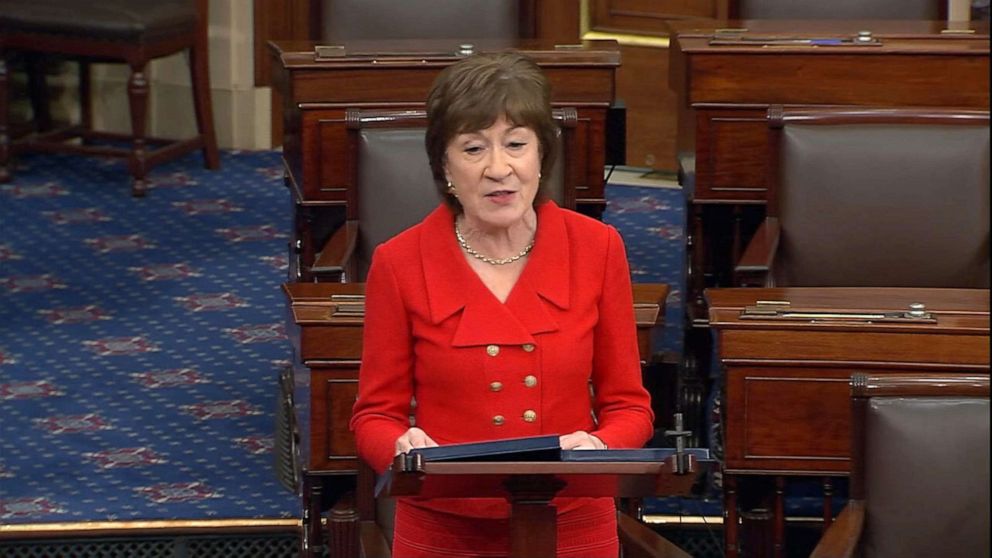


Maine Republican Sen. Susan Collins, one of a few remaining moderate senators who had yet to reveal their final votes, said Tuesday she will vote to acquit President Donald Trump on both articles of impeachment.
"I do not believe that the House has met its burden of showing that the president's conduct, however flawed, warrants the extreme step of immediate removal from office, nor does the record support the assertion by the House managers that the president must not remain in office one moment longer," Collins said in a Senate floor speech.
Collins' decision comes less than a day after her fellow moderate Republican, Lisa Murkowski of Alaska, announced that she also would vote to acquit. Trump's acquittal is all-but-certain, and the number of senators who could deflect from their respective party ranks is dwindling.
Democrats' hopes that at least some Republicans would defect had already dimmed considerably when Murkowski, on Monday evening, reluctantly announced her plans to vote to acquit Trump.
Her announcement came with a tongue-lashing of her colleagues on both sides of the aisle, Murkowski telling senators they "should be ashamed of the rank partisanship displayed" during the trial.
"So many in this chamber share my sadness for the present state of our institutions, Murkowski said. "It’s my hope that we’ve finally found bottom here."
Collins echoed Murkowski in her admonishment of the president, but she also rebuked Democrats, saying that the House had jumped to impeachment as "first resort" rather than a last, and that the House managers had failed to answer her Senate trial question about whether the president had committed a crime.
Senate Majority Leader Mitch McConnell on Tuesday implored his colleagues to acquit President Donald Trump on both articles of impeachment when the Senate takes a final vote in his trial Wednesday at 4 p.m.
"We must vote to reject the House’s abuse of power, vote to protect our institutions, vote to reject new precedents that would reduce the framers' design to rubble, vote to keep factional fever from boiling over and scorching our Republic," McConnell, R-Ky., said on the Senate floor. "I urge every one of our colleagues to cast the vote on the common good clearly required, vote to acquit the president of these charges."
McConnell’s call stood in sharp contrast to the statements of Minority Leader Chuck Schumer, who on Monday applauded the case put on by the House, lead by House Manager Adam Schiff, and called on Republicans to have courage to vote to remove Trump from office.
In a speech following McConnell on Tuesday, Schumer said that Republican's failure to call witnesses in the case makes people believe "that the administration, its top people and Senate Republicans are all hiding the truth."
"If Americans believe that they don't determine who is president, who is governor, who is senator, but some foreign country out of reach can join us on elections, that's the beginning of the end of democracy."
Though Collins announced Tuesday that she would vote in defense of the president, throughout the trial, she was a moderate voice. Collins was one of two Republican members to break with her party and vote in favor of calling witnesses in the trial.
Sen. Mitt Romney of Utah joined Collins, along with all 47 Democrats, in favor of subpoenaing former national security adviser John Bolton. It also remains unclear how Romney, at times a Trump nemesis, will vote on acquittal.
Three Democrats remain undecided heading into the final vote.
West Virginia Sen. Joe Manchin in a speech on Monday offered his colleagues an alternative to removal from office: censure.
"Censure would allow this body to unite across party lines and as an equal branch of government to formally denounce the President’s actions and hold him accountable," Manchin said.
So far, the motion for censure does not seem to have gained traction with Republicans.
Sen. Shelley Moore Capito, R-W.Va., responded with a simple "no" when she was asked if there was any appetite among Republicans for censure. That’s a sentiment being echoed by other Republican member.
Tennessee’s Lamar Alexander, who had held out the possibility of casting a deciding vote on calling witnesses but ultimately decided against it to much fanfare, said of censure on Tuesday, "I’m not considering that."
When proposing censure, Manchin did not say how he would cast his final vote on Wednesday.
Democratic Sens. Kyrsten Sinema of Arizona and Doug Jones of Alabama could defect from from their caucus on the vote to remove Trump.
MORE: Trump impeachment trial: Closing arguments ahead of acquittal vote Wednesday
A vote for censure would require a simple majority of the Senate, as opposed to the two-thirds majority required to remove Trump from office.
And as the acquittal vote approaches, at least one Republican who had been watched closely by the White House and GOP leadership announced his intention to support Trump.
"Impeachment negates an election in which Americans choose their leader. If substantial numbers of Americans disagree with removing the president, removal damages civic society.," Sen. Bill Cassidy said before announcing his intention to vote to acquit on both articles.
Cassidy said the House managers didn’t prove "beyond a reasonable doubt" that the president committed impeachable offenses, a standard the senator chose to employ in the absence of a constitutional requirement.
All 100 senators are expected to be present in the chamber Wednesday and will vote from their desks, signaling aloud either "Guilty" or "Not Guilty" when called by the clerk.
Two-thirds of senators present and voting are necessary to remove Trump from office.